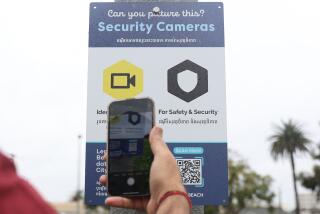More Cities Seeing WiFi Zones as Destinations
- Share via
Once a gloomy neighborhood of boarded-up storefronts, downtown Fullerton has enjoyed a revival over the last few years but is still in need of a key ingredient: more people.
City leaders believe technology may prove one way to draw them in.
In February, Fullerton began offering free wireless Internet service over 24 blocks in the city’s core, a project financed with $50,000 from the redevelopment agency and one that proponents hope will lure people -- and their spending -- downtown.
People such as James Campbell, who sat on a bench one recent day with his laptop reading e-mail and buying airline tickets while his 2-year-old daughter played at a downtown park.
“It was great,” Campbell said. “It frees us of those chains that bind us to our desk at home.”
Fullerton officials aren’t alone in seeing wireless Internet service, or WiFi, as an important part of redevelopment plans. From Los Angeles to Long Beach to Riverside, cities across Southern California -- and the nation -- are spending big bucks or recruiting donors to bring free WiFi to downtown areas, and in some cases to entire cities.
The networks, installed by cities and created with radios perched on streetlights, have a greater range than the “hot spots” popular in coffeehouses. Having WiFi access is becoming more important to people such as business travelers, who are choosing hotels based on whether they have free WiFi, said Curt Gibbs of Los Angeles’ Community Redevelopment Agency. Gibbs wants to attract those very people to linger downtown.
“Having Internet access is so important to doing business,” said Gibbs, whose agency will soon begin spending $25,000 a year to bring free WiFi to downtown’s Pershing Square.
Officials in Long Beach credit free WiFi with helping aid their downtown redevelopment. Soon after WiFi was launched there in 2003, Long Beach landed a major technology conference.
Other cities are looking at other advantages that city-sponsored WiFi networks can bring. Anaheim is building a pilot network for the city and its police and fire departments with about $1.4 million from the U.S. Department of Homeland Security.
A WiFi network allows patrol officers in San Mateo to receive high-quality mug shots while pursuing a suspect. In Fullerton, police tested a device that electronically scans fingerprints from a patrol motorcycle and sends them to a regional database. Other cities are considering WiFi networks that will message a parking enforcement officer’s personal digital assistant when a parking meter’s time expires.
Some cities want to broaden WiFi access. Philadelphia’s mayor has proposed building a citywide WiFi network that could cost $10 million.
But skeptics say cities are taking a gamble with taxpayer dollars by wading into a highly competitive telecommunications industry, in which some companies have gone bankrupt trying to build up WiFi.
Also potentially complicating matters is a new technology called WiMax, critics say. The proposed new standard promises to transmit wireless signals as far as 30 miles. WiMax signals can either be converted into WiFi signals or transmitted directly to WiMax-enabled devices. Intel, which is promoting WiMax, believes the new devices could start rolling out in 2006 or 2007.
“What happens if a city deploys a WiFi network and suddenly a WiMax provider comes along?” said Jeremy Stern, a lawyer for telecommunications companies. “The city is left with a stranded investment.”
But some analysts say WiMax could take much longer to roll out than Intel hopes. They note that industry groups have yet to finalize the WiMax technology and warn that initial WiMax devices will be costly.
In contrast, most laptops sold today already come equipped with a WiFi device, with at least 75 million WiFi-equipped devices worldwide already in existence.
“We won’t be getting WiMax computers in 2006. You’d have to get the whole world to throw out their WiFi chips,” said Esme Vos, founder of MuniWireless.com, a website about ongoing citywide wireless broadband projects.
Telecommunications companies in about a dozen states are seeking legislation to limit cities’ support of WiFi networks.
But cities maintain that there are huge benefits to implementing WiFi systems, which will not only serve residents but also make city operations more efficient. The completion of a network of WiFi-equipped utility meters in Corpus Christi, Texas, for instance, will allow the city to reassign 40 employees who now have to hunt around garages and backyards to read them, said Leonard Scott, an information technology manager.
More to Read
Inside the business of entertainment
The Wide Shot brings you news, analysis and insights on everything from streaming wars to production — and what it all means for the future.
You may occasionally receive promotional content from the Los Angeles Times.










